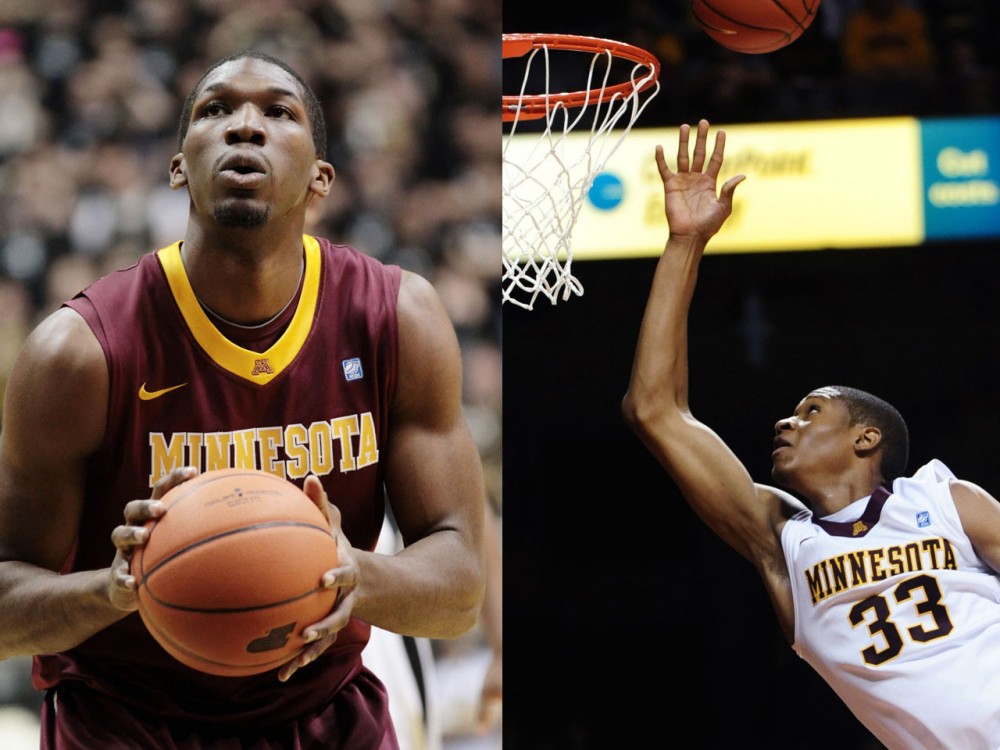Basketball players trying for a rebound have to watch the ball bounce around the rim and guess where it might go.
Now, Gophers players who might turn pro have to do the same thing with labor negotiations.
College players around the country are awaiting the outcome of a debate that would at least affect player salaries and at most delay or cancel next season.
The NBA is in the last year of its current collective bargaining agreement; a contract between the National Basketball Players Association and NBA owners stipulating the framework for how âÄî and how much âÄî players are paid. Though the deadline for a new CBA is months away, a lockout in 2011-12 is appearing more likely by the hour.
According to a Forbes magazine report, 17 of the leagueâÄôs 30 teams reported operating losses in fiscal year 2010, losing a combined $144.9 million. The league is projecting losses of $350 million next year, and owners are calling for playersâÄô salaries to be reduced by a total of $700-800 million.
As a result, current pro-caliber college athletes expecting a shot at the next level may not be in for as much cash as they had hoped. But more importantly, they may have nowhere to play next year if a lockout occurs and lasts throughout the season.
If there is a stoppage, Gophers menâÄôs basketball coach Tubby Smith said, “[Seniors] are the biggest problem because a lot of them are going to have to end up going overseas and stuff like that. ThatâÄôs something I know the seniors focus on more than the underclassmen.”
But it is MinnesotaâÄôs underclassmen that have popped up on the NBAâÄôs radar. Neither sophomore forward Rodney Williams nor redshirt junior forward Trevor Mbakwe have indicated they will go pro next year, but both are considered potential draftees.
Williams is projected as a “late lottery to mid first round” pick by ESPN.com.
Mbakwe, who leads the Big Ten in rebounding, field goal percentage and double-doubles, said he is aware of the situation in the NBA and that it may affect his plans and those of his peers, but that he has not had time to dwell on it.
“ThatâÄôs something IâÄôll worry about at the end of the season,” Mbakwe said, but added “I think a lot of players are going to change their plans.”
Asked whether any of his friends in college basketball are frustrated with the uncertainty surrounding the near future of the league, Mbakwe said, “IâÄôve talked to some people who [donâÄôt know] whatâÄôs going to happen âĦ but thatâÄôs something that nobody will know until July 1.”
That date, July 1, is when the CBA officially expires. It appears that the first crucial moment will be Feb. 18-20, All-Star weekend, when NBA owners will sit down with the players union and try to reach an agreement.
The likelihood of a lockout depends on who is asked, and which league is being asked about, as the National Football League is facing a similar âÄîthough less dire âÄî situation.
“If youâÄôre talking about which sport is more likely to lose a season or part of a season, itâÄôs absolutely the NBA,” Sports Illustrated staff writer Chris Mannix said in a Jan. 14 interview on New York Public Radio. “If, come July 1, theyâÄôre forced to lock out the players, every indication IâÄôve gotten is that theyâÄôre going to go for the jugular.”
Timberwolves center Anthony Tolliver, the teamâÄôs liaison to the players union, told KSTPâÄôs Joe Schmidt that union representatives told him to “prepare for a lockout.”
The Players Association executive director, Billy Hunter, has also indicated in published reports that a lockout is likely.
In an interview with the Minnesota Daily, Pat Forde, an ESPN college football and basketball reporter, stressed that no one knows what will happen, and that it would be unwise to make any sort of prediction regarding any labor dispute until substantive negotiations have taken place. However, Forde said, “My feeling is generally that the NBA and NFL are too smart to have a significant work stoppage because theyâÄôve seen whatâÄôs happened to leagues that have done that, notably the NHL.”
He added, “My gut feeling is that if people want to go pro, theyâÄôre going to go pro no matter what the situation looks like, unless itâÄôs absolutely prohibitive in terms of a lockout.”
If FordeâÄôs instincts are wrong and the NBA season is shortened or scrapped, NCAA basketball may have to serve as a healing tonic for hoops-starved fans.
A lockout will surely frustrate owners, players and anyone else with a stake in professional basketball, though it might not be such a bad thing for the collegiate game.
“[A lockout] might be beneficial to us,” Smith said. “If that happens, [fans] are going to flock to college basketball. College basketball is already very popular, but that would make us even more popular. I hope they donâÄôt do it. But if they do, we can benefit from it.”
– Josh Katzenstein contributed to this report.


